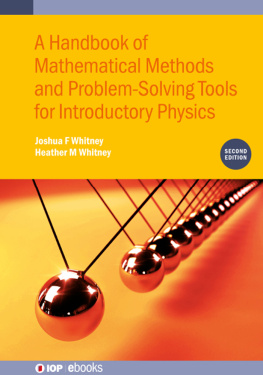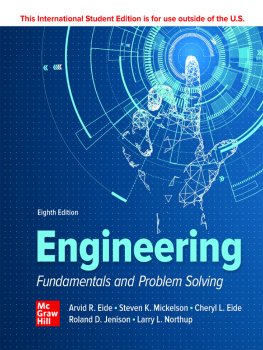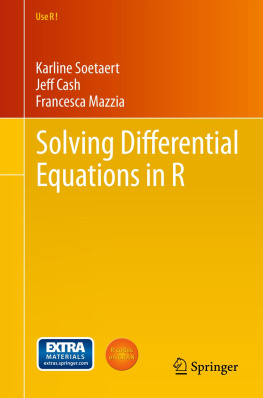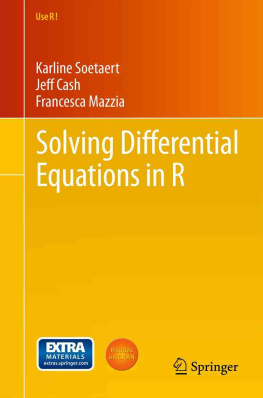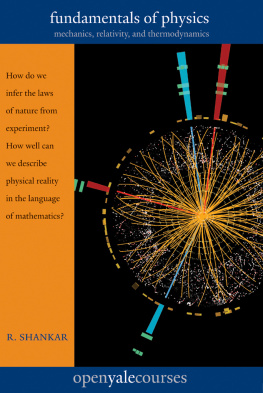Contents
Contents
A Handbook of Mathematical Methods and Problem-Solving Tools for Introductory Physics (Second Edition)
Joshua F Whitney and Heather M Whitney
Wheaton College, Wheaton, Illinois, USA
IOP Publishing, Bristol, UK
IOP Publishing Ltd 2021
All rights reserved. No part of this publication may be reproduced, stored in a retrieval system or transmitted in any form or by any means, electronic, mechanical, photocopying, recording or otherwise, without the prior permission of the publisher, or as expressly permitted by law or under terms agreed with the appropriate rights organization. Multiple copying is permitted in accordance with the terms of licences issued by the Copyright Licensing Agency, the Copyright Clearance Centre and other reproduction rights organizations.
Permission to make use of IOP Publishing content other than as set out above may be sought at .
Joshua F Whitney and HeatherMWhitney have asserted their right to be identified as the authors of this work in accordance with sections 77 and 78 of the Copyright, Designs and Patents Act 1988.
ISBN 978-0-7503-3399-3 (ebook)
ISBN 978-0-7503-3397-9 (print)
ISBN 978-0-7503-3400-6 (myPrint)
ISBN 978-0-7503-3398-6 (mobi)
DOI 10.1088/978-0-7503-3399-3
Version: 20210601
IOP ebooks
British Library Cataloguing-in-Publication Data: A catalogue record for this book is available from the British Library.
Published by IOP Publishing, wholly owned by The Institute of Physics, London
IOP Publishing, Temple Circus, Temple Way, Bristol, BS1 6HG, UK
US Office: IOP Publishing, Inc., 190 North Independence Mall West, Suite 601, Philadelphia, PA 19106, USA
For our students: past, present, and future.
About the authors
Joshua F Whitney and Heather M Whitney
Joshua F Whitney and Heather M Whitney have both taught at Wheaton College in Wheaton, IL in a variety of roles in the Department of Physics. Joshua is also an amateur bodybuilder and Megaman enthusiast. He completed his PhD in Physics at the University of Tennessee, working in theoretical particle physics. Since then he has spent considerable time teaching introductory and upper level physics classes and labs.
Heather is also an amateur gardener and cook, and fitness proteg of Joshua. She completed her PhD in Physics at Vanderbilt University, doing research at the Vanderbilt University Institute for Imaging Science. In addition to teaching physics, she conducts research in medical physics.
IOP Publishing
A Handbook of Mathematical Methods and Problem-Solving Tools for Introductory Physics (Second Edition)
Joshua F Whitney and Heather M Whitney
Chapter 1
Introduction
The purpose of this book is to fill in the holes, so to speak, that may be present after a student experiences lecture and lab on a given introductory physics topic and then tries to tackle problem solving on their own. In our experience, this independent effort of putting the pieces together is when the learning really happens, but students sometimes benefit from checking in with someone during that time. And sometimes that time comes when office hours are not available. So we wrote this little handbook with that situation in mind. It is comprised of a wide variety of insights, some big-picture, thinking-like-a-physicist kind of ideas, and some detail-oriented, such as the best way to put in positive or negative signs. Likewise, this handbook is written with both algebra- and calculus-based introductory physics students in mind. It has coverage of ideas that will apply to all students, regardless of which type of introductory physics class you are taking, and some calculus-specific ideas.
Thus, the handbook is best suited as a companion text when you begin to work through the actual homework problems after lectures. Each section will focus on a deeper understanding of the concept and equations you will be using along with problem-solving skills. Toward that end, most sections will begin with a very careful description of each concept and equation, what every symbol means and what the equation is saying in as simple terms as possible. Remember that equations themselves are merely tools for working with concepts and you will be in much better shape if you know what tool you are looking for before you start looking, thereby preventing you from wasting time, energy, and frustration trying to solve a problem with a hammer when you really need a wrench.
This book is intended to be as straightforward as possible so that it can be used as a study guide. Everything is explained thoroughly but we have tried to avoid being too funny or asking rhetorical questions or all the things that can contribute to a physics textbook being 1000+ pages long. Along these lines, we have also erred on the side of fewer figures than you might expect, because we anticipate that you will want to refer to your course textbook as much as possible to reconcile what you see here with its presentation by your instructor and textbook. Every section will contain small summaries and important points that, in all honesty, you could probably just memorize and do reasonably well on your physics tests. But you might not really understand the physics with this approach. A much better course of action is to study these, apply them, and when you do not feel like you need to memorize them anymore, you are in good shape. That is to say, the summaries can be used as a test themselves in that when they feel intuitive, you have a fairly solid grasp of the material.
It is important to note this book is not exhaustive for an introductory physics course, nor is it intended to be. It is focused on the things that students usually struggle with due to, in our opinion, the disconnect that can sometimes happen between lecture and problem solving. You may not find the exact examples or explanations you are looking for, but the problem-solving techniques and conceptual explanations can be applied to almost anything in your introductory physics course. You can think of this handbook as a style manual of sorts for physics, but in a problem-solving sense. Just as with a writing handbook you would look at specific examples and then apply them more broadly as similar situations come up, you can take the ideas of this book and apply them to other problems in physics as well.
Our most significant piece of advice to students of introductory physics is that you should make time for trying problems that are new to you, without having a textbook open, and under some kind of time limit. Doing so gives you the opportunity to put all the pieces together that you are learning and make them your own. Any student we have ever had who takes this advice learns physics well. This book can support this process as a stand-alone resource for quick checks on a physics principle and how it is solved, which can then be used to inspire work on the problem at hand.
Above all, we wrote this handbook with our students, past, present, and future, in mind. We tried to consider the questions they have frequently had and what types of advice and suggestions from us seemed to be effective when implemented by them. A wonderful experience of teaching is that we teach but also learn from students. We have learned much from ours and dedicate this book to them.

